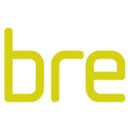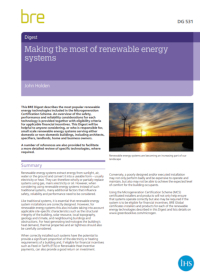Making the most of renewable energy systems DG 531
Making the most of renewable energy systems (DG 531) was written by John Holden and published on 30 June 2014. BRE (Building Research Establishment) is an independent, research-based consultancy, testing and training organisation, operating in the built environment and associated industries.
Renewable energy systems extract energy from sunlight, air, water or the ground and convert it into a useable form – usually electricity or heat. They can wholly or partially replace systems using gas, mains electricity or oil. However, when considering using renewable energy systems instead of such traditional systems, many additional factors that influence safety, reliability and performance need to be considered.
This 12-page BRE Digest describes the most popular renewable energy technologies included in the Microgeneration Certification Scheme. It provides an overview of the safety, performance and reliability considerations for each technology, together with eligibility criteria for financial incentives.
It is intended for anyone considering, or responsible for, small-scale renewable energy systems serving domestic or non-domestic buildings. This includes architects, specifiers, landlords, home and business owners. A number of references are provided for a more detailed review of specific technologies.
Its contents are:
- Introduction.
- Performance.
- Reliability.
- Feed-in Tariffs.
- Solar thermal collectors.
- Renewable Heat Incentive.
- Biomass.
- Small and micro wind turbines.
- The Microgeneration Certification Scheme.
[edit] Related articles on Designing Buildings Wiki
- BRE articles on Designing Buildings Wiki.
- BRE Buzz articles on Designing Buildings Wiki.
- BREEAM Energy efficient equipment
- BREEAM Free cooling
- BREEAM Low carbon design
- BREEAM LZC technologies
- BREEAM Passive design
- BREEAM Reduction of energy use and carbon emissions
- BREEAM.
- Building Research Establishment.
- Financing our future energy infrastructure
- Geothermal energy.
- Microgeneration Certification Scheme.
- Renewable energy.
- Solar photovoltaics
- Solar thermal systems.
- Tidal lagoon power.
- Types of fuel.
- Wind Energy in the United Kingdom.
- Wind farm.
- Wind turbine.
Featured articles and news
Apprenticeships and the responsibility we share
Perspectives from the CIOB President as National Apprentice Week comes to a close.
The first line of defence against rain, wind and snow.
Building Safety recap January, 2026
What we missed at the end of last year, and at the start of this...
National Apprenticeship Week 2026, 9-15 Feb
Shining a light on the positive impacts for businesses, their apprentices and the wider economy alike.
Applications and benefits of acoustic flooring
From commercial to retail.
From solid to sprung and ribbed to raised.
Strengthening industry collaboration in Hong Kong
Hong Kong Institute of Construction and The Chartered Institute of Building sign Memorandum of Understanding.
A detailed description from the experts at Cornish Lime.
IHBC planning for growth with corporate plan development
Grow with the Institute by volunteering and CP25 consultation.
Connecting ambition and action for designers and specifiers.
Electrical skills gap deepens as apprenticeship starts fall despite surging demand says ECA.
Built environment bodies deepen joint action on EDI
B.E.Inclusive initiative agree next phase of joint equity, diversity and inclusion (EDI) action plan.
Recognising culture as key to sustainable economic growth
Creative UK Provocation paper: Culture as Growth Infrastructure.
Futurebuild and UK Construction Week London Unite
Creating the UK’s Built Environment Super Event and over 25 other key partnerships.
Welsh and Scottish 2026 elections
Manifestos for the built environment for upcoming same May day elections.
Advancing BIM education with a competency framework
“We don’t need people who can just draw in 3D. We need people who can think in data.”























